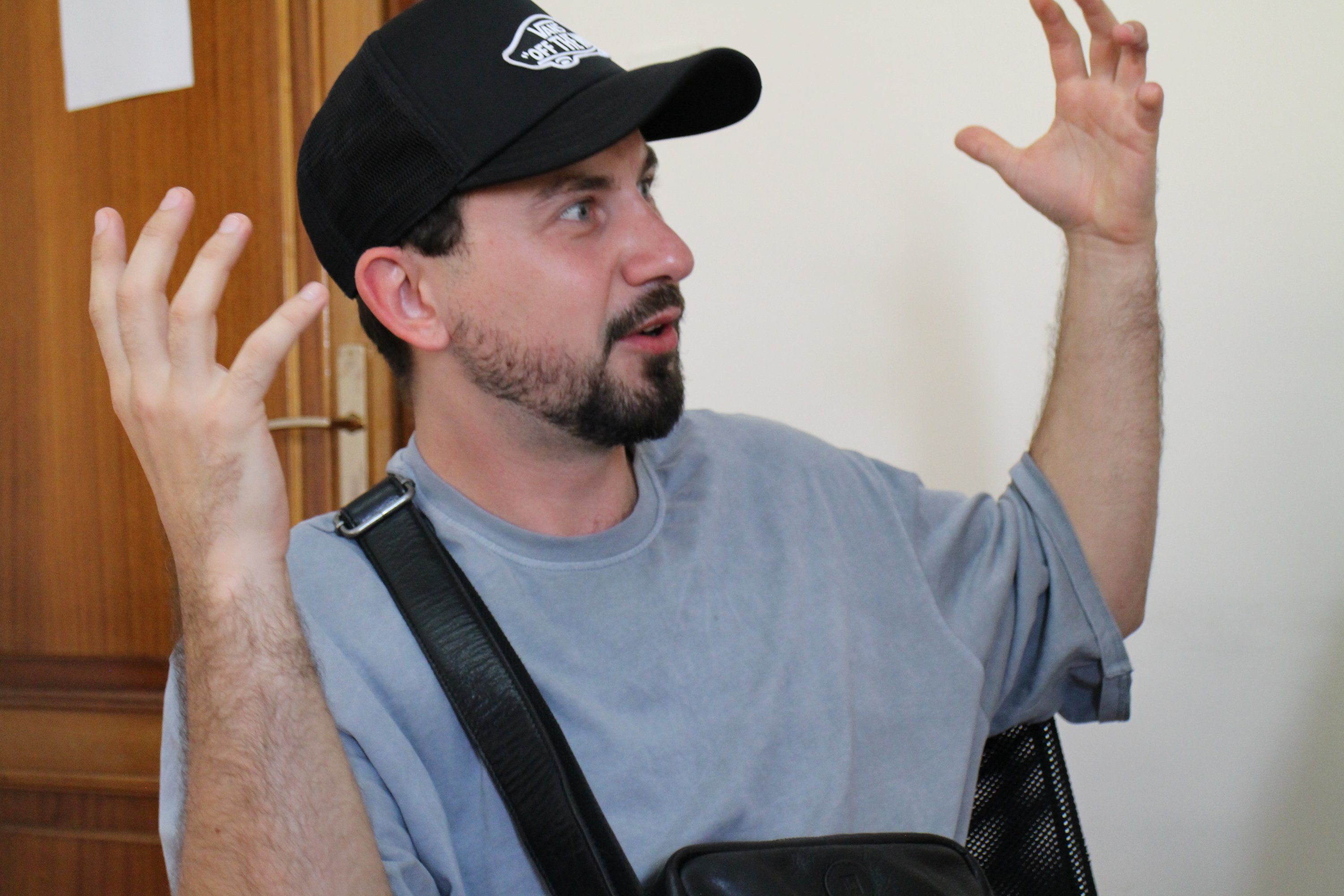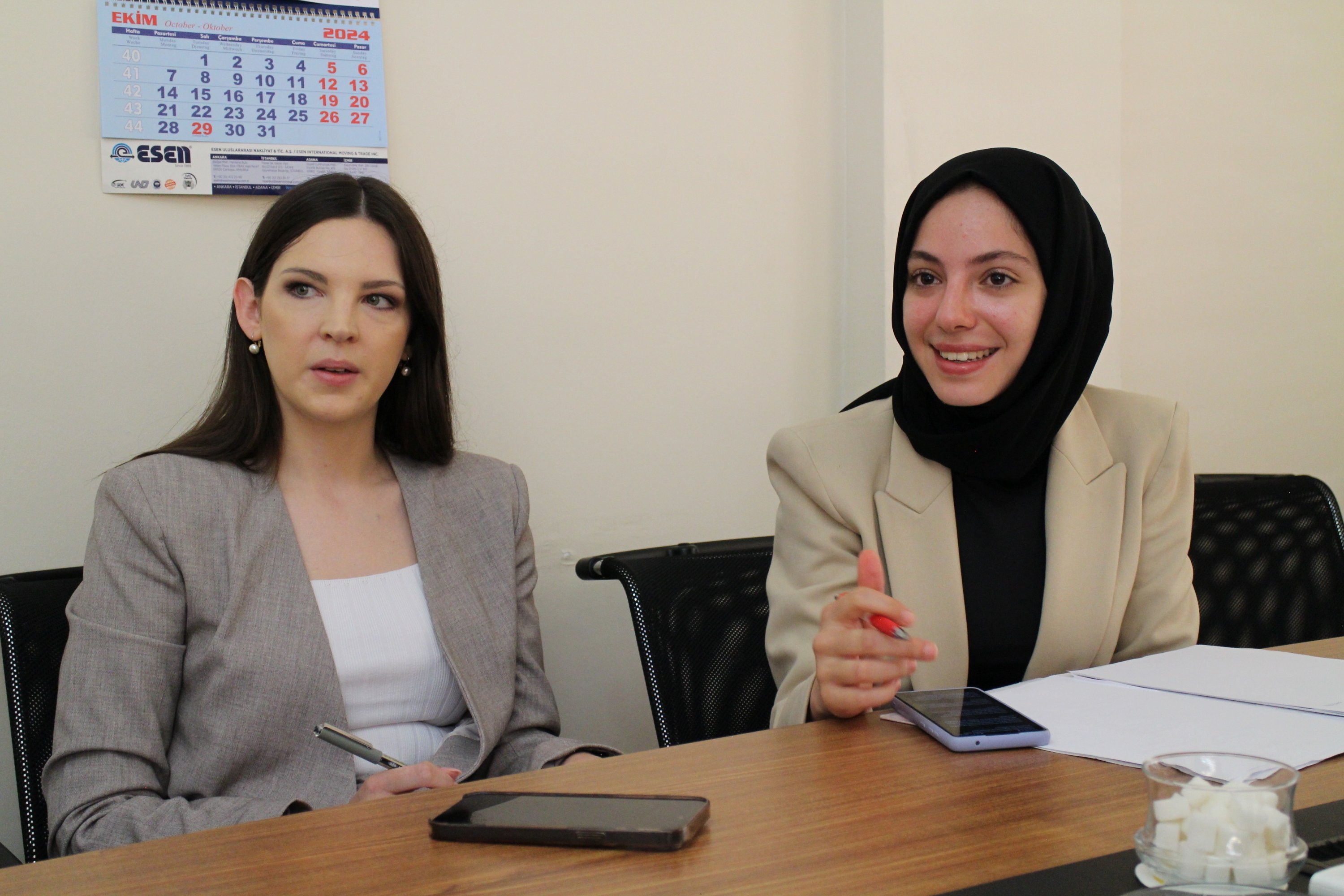The Ukrainian music group Cultural Forces, known for celebrating Europe’s cultural richness and artistic exchange, recently completed a tour in Türkiye. In an interview with Daily Sabah, the group’s leader, Mykolai Sierga, discussed the impact of their music during wartime and their views on cultural diplomacy.
In Istanbul, Sierga said: “Cultural interactions play a crucial role, especially during wartime. Music is a powerful tool for expressing emotions and building unity during these periods,” highlighting how music reflects the hardships of war and provides hope.
“During wartime, music carries a meaning beyond pain and loss. Creativity and artistic expression are ways to survive and maintain social cohesion during these challenging times,” he explained. Sierga discussed how the group’s music reflects the effects of war and how these experiences have shaped their style.
Reflecting on their experiences in Türkiye, Sierga noted: “The interest and support we encountered in Türkiye were a significant encouragement for us. Building bridges with people from different cultures through music is an important step both artistically and diplomatically.” He added that the group’s performances and interactions in Türkiye have contributed significantly to international relations.
The Cultural Forces group emphasizes both music and cultural diplomacy. “Cultural diplomacy has great potential in promoting understanding and respect between different cultures,” Sierga said, underscoring the importance of their work in this area.
“Our music does not merely entertain; it also raises awareness about social messages and international relations. Even during wartime, we aim to create a positive impact through music,” he added. Sierga considered their concerts and events in Türkiye to be significant milestones in their international music career, noting that such cultural interactions deepen connections between different cultures.
“We view our music not only as an art form but also as a tool for cultural and diplomatic purposes. We hope these events foster understanding and peace beyond war and conflict,” he concluded.
The group also highlights the impact of combining music and activism on social change. Member Ismail Kurt-Umer shared how he integrates his artistic life with activism.
Kurt-Umer said supporting Ukrainian soldiers and citizens has become a core part of his artistic life. “My purpose now is to support both Ukraine and our soldiers and people. My art, personal life and activism have become one. I constantly reflect my Muslim and Crimean Tatar identities in my art, showing how these identities play a role in Ukraine’s struggle through my work,” he said.
Kurt-Umer emphasized the contributions of Muslims and Crimean Tatars in Ukraine’s war. “In the Ukrainian Armed Forces, one out of every four battalions includes a Crimean Tatar. There are 1.5 million Muslims in Ukraine, and they are also fighting for Ukraine’s independence. I convey this struggle through my art,” he stated.
Group member Taras Stoliar discussed his musical background and the historical significance of the Bandura instrument. Having started music school at a young age, Stoliar described the Bandura as not just a musical instrument but a narrative tool deeply tied to Ukrainian history. “Our teachers told us that the Bandura is not merely an instrument but a representation of history and the people’s origins. Therefore, I play not only Ukrainian music but also music from different cultures,” he said.
Stoliar reflected on his experience in Türkiye, noting, “I do not only play Ukrainian music in Türkiye. For example, during our performance at BAYKAR, I played ‘Çanakkale Türküsü,’ and I saw that people greatly enjoyed it. I felt like a rock star.” He highlighted that bridging different cultures is possible through the universal power of music.
Sylhei Ivanchuk discussed the changes in his life due to the war. “Everything in my life changed after these events. I started thinking that every moment could be my last. I am now questioning what legacy I will leave to the world,” Ivanchuk said, noting that understanding the impact of his art on people during wartime was a turning point for him.
Ivanchuk emphasized the importance of supporting Ukraine as an artist abroad. “Through art, we reach diplomats, businesspeople and the public. Recently, we raised 10 million euros ($11.05 million) to support Ukraine, and I could not have achieved this without my songs,” he added.

As Ukraine moves into a transformative period in cultural and diplomatic arenas, Safiye Lenter-Qizi, a multifaceted artist and cultural diplomat with Cultural Forces, combines art with advocacy. She passionately shares her journey of self-discovery and artistic expression through diplomacy.
In an exclusive interview with Daily Sabah, Safiye remarked: “My mother always told me that I could be an artist. She would say, ‘You can do anything you want.’ I was initially annoyed by these words because I just wanted to sing. But over time, I realized she was right. Today, I am a talented musician with a successful career and a proficient business analyst. I can realize my own projects,” she stated.
Despite lacking financial support from any government, Safiye highlights that her team has thrived with the support of people who believe in their mission.
Safiye’s work uses culture as a communication tool, storytelling and advocacy. “I reach people through culture, talk to them, tell stories and write. This is our mission,” she said, likening her mind to a music box. “Many things are spinning in my head, sometimes things I don’t even want to know. Growing up in Crimea introduced me to many Russian songs; unfortunately, I had no choice. However, this experience helps me regardless of the language I sing in.”
Safiye speaks several languages, including Latin, English, Turkish, Ukrainian, Russian, Crimean Tatar, Spanish and French, integrating these into her music to reach diverse audiences. “Each of these languages enriched my music career and contributed to my cultural diplomacy work,” she noted.
Oleksiy Makulskyi shared his deep connection with music and its role. He emphasized music’s central role: “My life was a part of the world.” He said that the melodies of the East, particularly Armenian music, resonate deeply with him. “I listen to myself, and my heart responds. If it reacts with love, this music creates a harmonious space for me,” he said.
Makulskyi’s interest in Saz’s music and connection with it has significantly influenced his art. “I heard harmonic Saz music, and it captivated me. I was thrilled. It was a very short instrument for our country,” he said.
With the outbreak of war, his interest in music was temporarily overshadowed. “I found a Saz before the war started, but once the war began, I had to focus on other things. With rockets starting to fly in Kyiv, I had to pick up the camera again. I had previously worked as a cameraman and journalist,” he added. Despite the challenges of war, he continued his art by shooting documentary films and creating documents for a year and a half. Makulskyi discussed reconnecting with music after the war, stating, “I continued listening to Turkish music and tried to play with the Saz. I worked on my own training without a third teacher,” underscoring the importance of music in his life.
Makulskyi’s words reflect his deep connection with music and the inspiration he draws from it despite the difficulties of war. He uses music as both a refuge and a means of expression, ensuring the continuity of his life and art.

Sierga and his group highlight two main objectives during their visit to Türkiye. First, they aim to strengthen the deep-rooted cultural ties with Türkiye. They seek to learn about music genres and instruments in Türkiye to enhance cultural interaction. Sierga stated, “We want to develop a deep understanding of the music preferences and the instruments that the great Turkish people are interested in.” He added, “In the future, we plan to strengthen these ties and visit Türkiye regularly.”
Second, Sierga mentioned their intention to thank the “great Turkish people” and call for support for Ukraine. “This visit is an important step in promoting cultural exchange between the two countries and building bridges through music,” he said.
The group aims to further strengthen relations between Ukraine and Türkiye through music and cultural interaction and to share cultural heritage. This visit is seen as a significant opportunity to enhance the cultural richness between the two countries.
In conclusion, the group’s shared message emphasizes the power of art to drive social change. They believe their struggle for Ukraine gains more meaning through art, stating, “Art is not only about entertainment but also a tool for raising awareness,” highlighting art’s unifying and hopeful impact during these challenging times.
